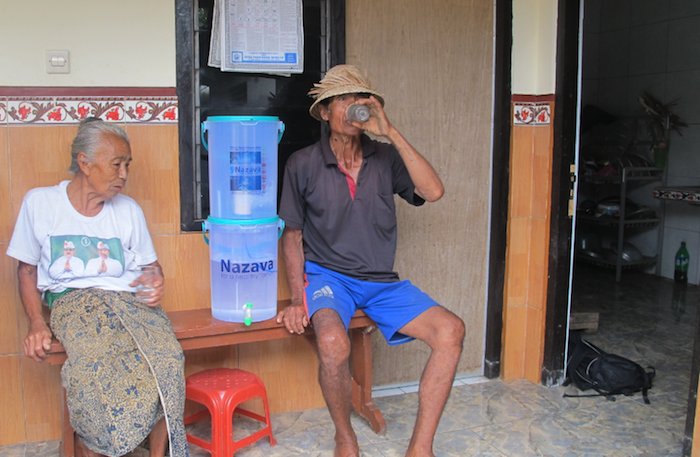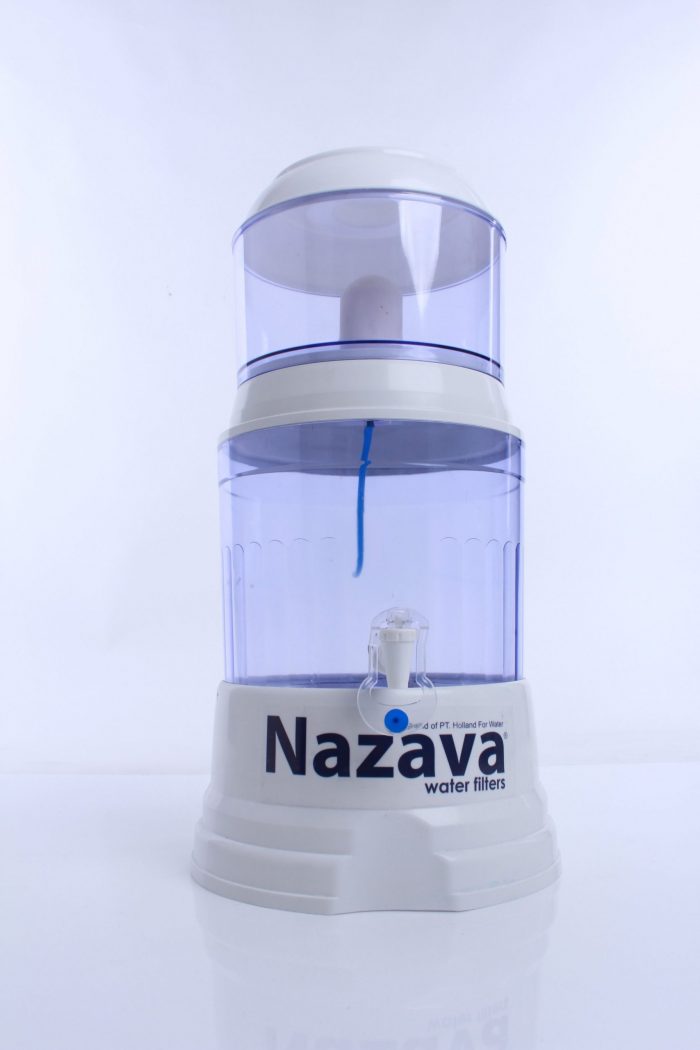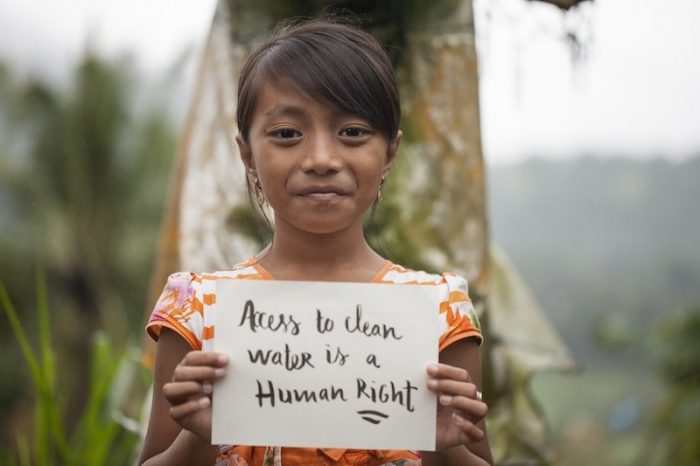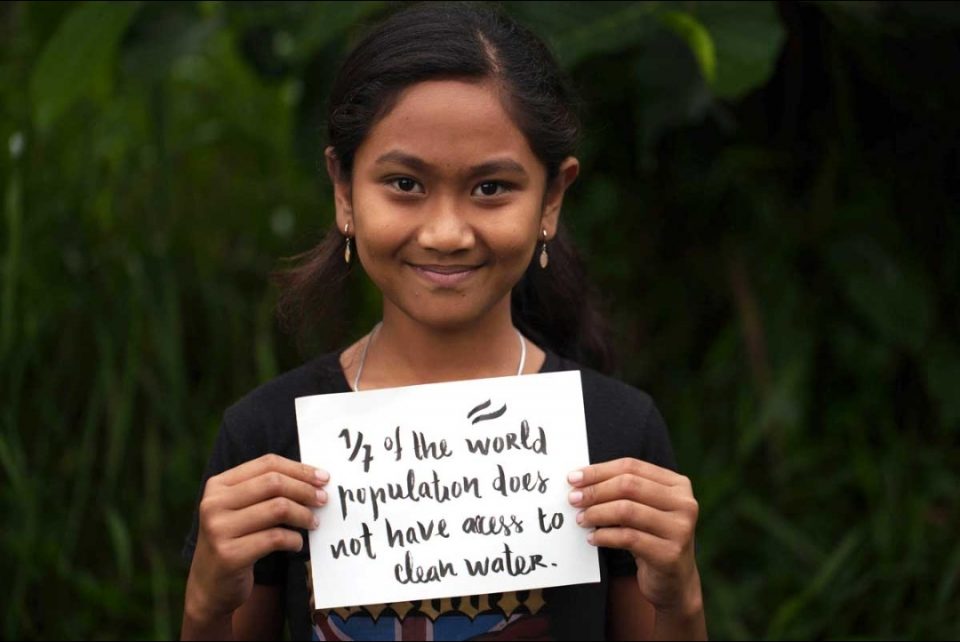In a time of highly degraded water resources and uncertainty linked to climate change, Social Impakt was set up in Indonesia.
It’s a social project aimed at providing clean and affordable drinking water for the less fortunate population of the archipelago.
Under the control of its Dutch founder Jeroen Van Overbeek, the social enterprise promotes and distributes a very easy-to-use water filtration system produced in Bandung, based on simple and easy-to-maintain ceramic filtration technology originating from the Netherlands called Nazava Water Filters.
Without entering into too many technical details, it’s useful to understand that Nazava technology is very simple and consists only of ceramic impregnated with silver and a core of activated carbon.
The ceramic filter contains pores of 0.4 microns, able to stop micro-organisms, bacteria, cysts, parasites, fungi, and other particles in the water collected from anywhere, except seawater.
During its life span, the ceramic water filter can purify 7,000 litres of water, which translates into three years of use, before it needs to be replaced for only Rp135,000.
The filter is easy to install and keep clean.
Social Impakt is targeting the distribution of the Nazava water filtration products to the rural communities of Bali and eastern Indonesia. primarily in East Nusa Tenggara. A solid and regular business market base, made up mostly of the emerging Balinese middle class and expatriates living on the island, has been the longstanding foundation of this business.
“The wellbeing of the people is our main point of focus. You have to remember that about 35 million Indonesians don’t have access to clean drinking water. 27,000 children die every year in Indonesia because they drink contaminated water,” explained Jeroen Van Overbeek, who started his company back in 2014.
Indeed, access to clean water remains a big issue in Indonesia, especially in eastern Indonesia where the climate is drier and the water tables are very often inaccessible, even with deep drilling. The recurrent food security problems have made stunting something very common in the country; around 30 percent of children suffer from it, with places like Sumba noting even higher rates.
Social Impakt started its crusade in Bali when Jeroen Van Overbeek launched his first pilot project in Karangasem, a region notorious for its lack of water. “Ceramic filtration was quite mysterious for them and we had to create certain awareness and trust. We had to prove that our filtered water was safe. It is five times less expensive than boiled water and 30 times less expensive than water sold in gallons. It also tastes better and retains minerals,” he explained.
As these filters come with very affordable price tags and the return on investment for a local Balinese family comes between two to three months.
It’s something easy to consider for urban middle-class households but more difficult for poor rural communities who don’t think far ahead in terms of budget planning.
Fortunately, Social Impakt has come into play to help promote and sell their products in Indonesia, starting in 2009. For example, as a customer of Social Impakt, you can buy two filtration systems – one for you and also one for a family in need somewhere between Bali and eastern Indonesia through their special offer “two purchased, one given”.
The local Balinese market is growing fast and fueling the distribution of these filtration systems in more secluded regions, whether in Bali or anywhere else in eastern Indonesia. In Bali, two-thirds of Nazava buyers are now urban Balinese families and the other third is expatriates – a figure that was completely opposite when Jeroen Van Overbeek initially started Social Impakt.
When Lombok was hit by a devastating earthquake in 2018, Social Impakt jumped in and provided thousands of filters, helping to stop all diseases linked to polluted water in the aftermath of the disaster. It was all paid for by NGOs through their fundraising campaigns.
Thousands of filtration kits were also distributed to the refugees of the Mount Agung eruption in Bali, as well as in Palu after the tsunami.
Jeroen Van Overbeek said that he simply erased his business margin for these occasions, allowing the distribution of 1,000 more filters to the refugees. But the Dutchman also pointed out that a social enterprise has to stand for profit and should not solely rely on charity. About 30 percent of Social Impakt activities are still based on charity fundraising campaigns, like the Karangasem village and school project the company implemented in 2017, after a successful crowdfunding campaign.
When Social Impakt collaborates with NGOs, it also does so with private companies and expatriates. Jeroen Van Overbeek confirms that management teams at hotels and other tourist facilities are also interested in the Nazava products. Needless to say, the tourism industry consumes water at an alarming rate compared to local communities!
When asked about the main benefits of these filters, the entrepreneur firstly named the money that people can save when using them. This is arguably the number one reason to invest in a filter. The second point is the health benefits. Safer than boiled water, Nazava filtered water is actually of better quality than the popular brands of drinking water sold at your local warung or supermarkets because it contains more minerals. And thirdly, there’s an environmental impact, with no carbon dioxide emissions to filter the water as compared to boiling.
Finally, no single-use plastic containers are being used to store it.
Since its introduction in Indonesia in 2009, Nazava filters have been used by 2.5 million Indonesians, a figure in which Social Impakt is responsible for more than 10 percent. The brand has many dealers on the main islands of the archipelago such as Java, Sumatra, and Kalimantan.
But according to Jeroen Van Overbeek, the target for the next two years is to find one million more users. The World Health Organisation has given its endorsement to the product and international laboratories have given their green lights through proper, complete lab tests.
The Dutch social entrepreneur is very optimistic about the future of these filters in Indonesia, particularly in East Nusa Tenggara where clean drinking water is still scarce. “This is where my motivation lies. We will achieve our target through presentations as we did in Bali some years ago. Education is of prime importance, we are going to present our solutions in schools there. We have already started in Labuan Bajo and it’s looking pretty good,” he conveyed with confidence.
With the COVID-19 pandemic, most of the local people in Bali have lost their jobs and livelihoods have disappeared. There are no tourists anymore, families struggle to make ends meet, and every penny saved makes a huge difference. Social Impakt has launched a crowdfunding campaign to support local families in need with a water filter to help them save money, improve their health, and give access to clean and affordable drinking water to the underprivileged families in Bali.
Visit their crowdfunding page :
https://donorbox.org/clean-water-for-bali




